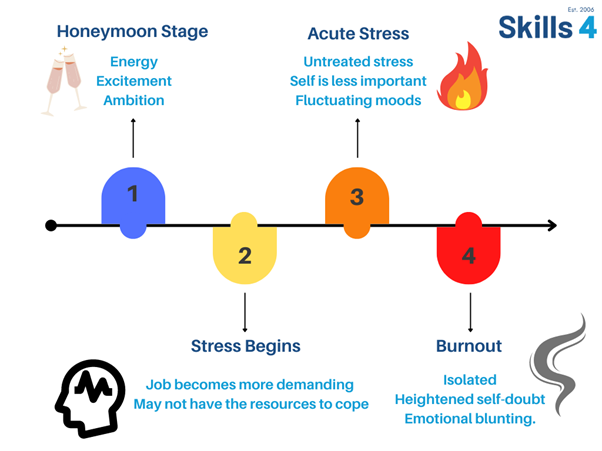With working at home being more common for us these days, it’s worth reflecting on our own health and wellbeing when we don’t have that commute to bookend our working day.
These days, it feels like there’s a silent pressure saying we need to work more hours, work later, start earlier to show what we’re capable of and to deliver the work required of us. Sustaining this for a while can be manageable, but after a while that enthusiasm and initial energy can start to drain away and we can be left feeling exhausted and empty.
If this feels familiar to you, then you may be experiencing or have experienced burnout.
Burnout is a syndrome and has been defined by the World Health Organisation (WHO) as:
“Chronic workplace stress that has not been successfully managed.”
Burnout isn’t a medical condition and can only be used in an occupational context and not to other parts of life.
Burnout has three characteristics which can be used to identify its presence.
What’s important at this stage is realising that burnout doesn’t happen overnight, it’s a slow burn with the below infographic explaining the four stages of burnout:

Recognising and intervening at an early stage is so important, becoming aware of our stress levels and identifying coping strategies early on is key to reducing or even avoiding burnout.
Recognising the difference between having negative feelings and burnout is vital as feeling sad or down isn’t the same as burnout. For example, we can feel sad, and sadness is a symptom of depression, but it doesn’t meet the threshold for diagnosis by itself, especially when those feelings of sadness are short-lived.
If you’re thinking of everything as too much, then this is stress.
Stress is too much work, too much happening, too many things to do, too much anxiety.
But burnout is the opposite.
You lose everything and it’s not enough. Not enough motivation, not enough hope, don’t care enough.
It can feel like you’re done and you don’t want anything more to do with work.
At this point of burnout, it’s too late for preventative care and interventions, we need professional help and recovery can take over 12 months if it is especially severe.
There are many resources out there to help with burnout from the NHS to the Mental Health Foundation for which we’ve included links below. But most importantly, getting those coping strategies in during the honeymoon period and taking the time to look after yourself is vital.
Header Photo by Tangerine Newt on Unsplash
